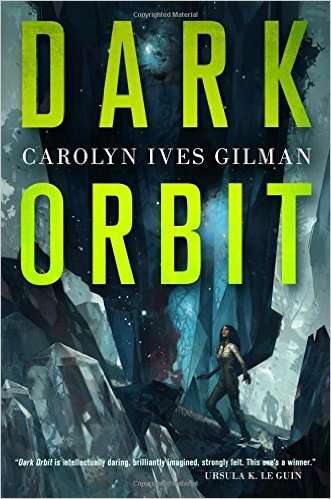Dark Orbit
Carolyn Ives Gilman
Tor
Release Date: July 14, 2015
ISBN 978 0-7653-3629-3
So much of the science fiction genre – the “ships in space” part of the genre – has, understandably, been based on exploration and discovery. I mean, what can be more exciting than imagining new worlds, new creatures, new sensibilities, and then interacting with them? Sometimes, though, it can seem that new sci-fi tales that hinge on exploration and discovery are more variations on a theme rather than truly original works. If done well, no problem. If just the same old, same old, well…
I’m happy to report that Carolyn Ives Gilman’s new novel, Dark Orbit, is definitely not in the “same old, same old” category. While the basic framework of the story may be familiar – a spaceship in search of habitable worlds finds a promising candidate but unforeseen danger threatens not only the mission but the crew itself – the pacing, focus, reveal and ramifications of this scenario in this novel is truly different, without resorting to hysteria or a spiraling-out-of-control fantasticism.
Sara Callicott is, on paper, an exoethnologist (the scientific discipline that studies newly discovered civilizations), but she is to exoethnology what Indiana Jones is to archeology: adroit and knowledgeable, yes, but also known for slightly more mercenary pursuits and an unrepentant way of pursing them. She has recently been attached to a group of scientists being ferried to the ancient robotic questship Escher, which after a generation has transmitted information suggesting discovery of a habitable planet fifty-eight light years away. While the human diaspora that generated the questships has passed, the discovery of a habitable planet is quick to attract the attention of giant corporations that stand at the ready to appropriate resources and new alien technology.
That’s not why Sara has been requested for this expedition, though. All indications suggest that the planet isn’t even inhabited. No, Sara has been asked to join in this mission as a favor to her patron and former mentor, a politically connected Vind from a powerful family. Apparently, he has a young relative who suffered a mental breakdown while in the role of emissary to a developing planet; she imagined she was receiving revelations from a god which stirred up the beginnings of a revolution, and had to be extricated in a most delicate – and clandestine – way. Now supposedly “completely cured,” this young woman, Thora Lassiter, has been assigned to the Escher (“Sending her fifty-eight years into the future seemed like a rather permanent way to get rid of a temporary problem. Almost like a punishment. Or a cover-up.”), and Sara has been asked to keep an eye on her, and as well as report back any other, well, opportunities that arise.
Of course, what seems like a routine fact finding mission turns out to be anything but. Not only is the planet unlike anything yet experienced – a crystalline planet, with sharp, prismatic environments, evidencing temporal and spatial anomalies, and in a region of space that is abnormally full of dark matter (a real world hypothetical kind of matter that does not emit or absorb light or any other significant electromagnetic radiation, but which is believed to account for most of the matter in the universe) – but it also is inhabited with what appears to be human descendants living far below the hostile surface.
It is Thora Lassiter who stumbles upon the indigenous inhabitants; or rather, it is an indigenous inhabitant, a young girl named Moth, who stumbles upon Thora. Unable to contact the ship, an ailing Thora is led by Moth to the habitude of Torobe, located in complete and absolute darkness. The people of Torobe, while able to speak an archaic form of Universal (the generic language of the Twenty Planets of humankind), are blind, without even a vague concept of “light” or sight. Thora must struggle not only with having to communicate with people who know nothing of light – not even concepts that hinge on “seeing”, such as distance, place, privacy or perspective – or any kind of advanced technology, but also deal with her own reactions to the sensory deprivation of being in totally darkness, with not even a glimmer to give her a moment of relief.
Things aren’t going well back on the ship, either. Not only has Thora inexplicably disappeared, but there has been a murder, and a key piece of equipment needed to ensure safe passage of the crew has been damaged, with replacement parts years away. Paranoia is high, internal squabbling between the different scientific disciplines is ratcheting up, and Sara seems to be continually at odds with Dagan Atlabatlow, an Oremen who is the expedition’s Head of Security.
Then things really go haywire.
Written partially from Sarah’s somewhat prickly point of view (she was raised Balavati, which meant “…she had been taught to reject all articles of faith except disrespect for authority”), and partially gleaned from the audio diary of Thora Lassiter, Dark Orbit is able to follow the drama on two fronts: the personality driven, squabbling one-upmanship, bureaucratic skullduggery of the Escher and the simpler, necessity driven, cerebral and spiritual community found in Torobe. When a transcendent ability of the native “wenders” is realized by the off-worlders (and experienced by Thora, who struggles to apply any rationality to it), the question of indigenous rights falls directly into Sara’s wheelhouse. But when the dark matter packed universe messes with both realms, the two disparate groups must work together to ensure the survival of all.
Regardless of what type of science fiction enthusiast you are, you will find something wonderful in Dark Orbit: pulse pounding action, intrigue, well developed characters, cerebral techno-speak (that even a novice like me can still understand), musing on galactic ethics and consciousness probing, and ethereal mystical stuff that gets really, really deep. Oh, and caves and crystals and some military stuff, too. And each aspect of it is well written, regardless of whether its appealing to the mind, or the heart. Add into that incredibly unique and wonderfully realized challenges that really push the boundaries of where-no-one-has-gone-before, and you have a book that’s well worth the read, even if you aren’t a hardened science fiction fan.
I’d be very, very surprised if Dark Orbit doesn’t show up on a few awards longlists next spring. Read it now, and beat the rush when the accolades start pouring in!
~ Sharon Browning


